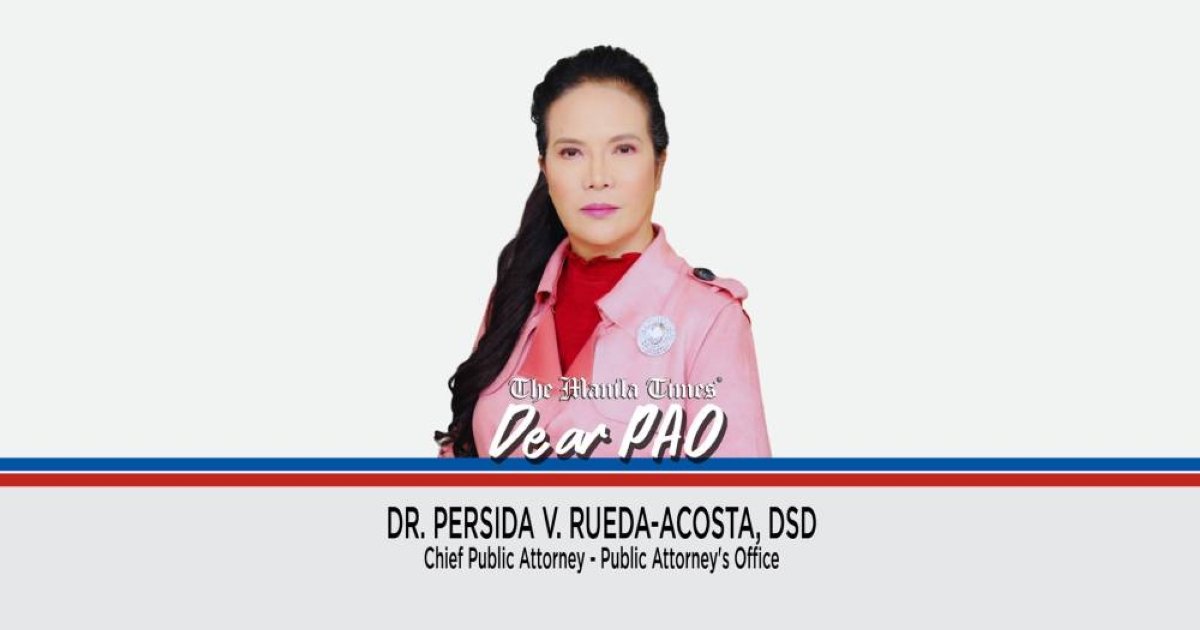Dear PAO,
I read somewhere that “insanity” can be used as a way to evade criminal liability. Does the person raising such a defense need to prove it or he may just play along and pretend to be insane in court and be granted immunity from criminal actions? What is insanity as a defense and how does it apply?
Dsk
Dear Dsk,

Please be informed that insanity as an exempting circumstance is provided under Article 12 of the Revised Penal Code, which states:
“Article 12. Circumstances which exempt from criminal liability. – the following are exempt from criminal liability:
“1. An imbecile or an insane person, unless the latter has acted during a lucid interval.
“When the imbecile or an insane person has committed an act which the law defines as a felony (delito), the court shall order his confinement in one of the hospitals or asylums established for persons thus afflicted, which he shall not be permitted to leave without first obtaining the permission of the same court. xxx”
However, mere invocation or manifestation of “insanity” in court does not automatically exempt a person from criminal liability. In the case of People of the Philippines vs. Lito Paña y Inandan, GR 214444, Nov. 17, 2020, citing the case of People vs. Formigone, the Supreme Court, speaking through Senior Associate Justice Marvic M.V.F. Leonen, clarified the three-way test, viz.:
“Considering the foregoing, we clarify the guidelines laid down in Formigones. Under this test, the insanity defense may prosper if: (1) the accused was unable to appreciate the nature and quality or the wrongfulness of his or her acts; (2) the inability occurred at the time of the commission of the crime; and (3) it must be as a result of a mental illness or disorder.
“We now use a three-way test: first, insanity must be present at the time of the commission of the crime; second, insanity, which is the primary cause of the criminal act, must be medically proven; and third, the effect of the insanity is the inability to appreciate the nature and quality or wrongfulness of the act.”
The principle is founded on the concept that actions can only be considered criminal if there is a criminal intent. Without such voluntariness, or an understanding of the wrongful act, the person charged may not be held liable for the crime. In the case of insane persons, they lack the faculty of appreciating the nature and quality or the wrongfulness of the act. Nevertheless, the presumption is that a person is sane, and the person asserting insanity must prove such insanity.
Thus, a person asserting insanity must be able to satisfy the three-way test mentioned above to properly invoke it as an exempting circumstance. First, the insanity was present during the commission of the crime. Second, the insanity, as the primary cause of the criminal act, must be medically proven. Lastly, the insanity should make the accused incapable of appreciating the nature and quality, or wrongfulness of the act.
We hope that we were able to answer your queries.This advice is based solely on the facts you have narrated and our appreciation of the same. Our opinion may vary when other facts are changed or elaborated on.
Editor’s note: Dear PAO is a daily column of the Public Attorney’s Office. Questions for Chief Acosta may be sent to [email protected]










